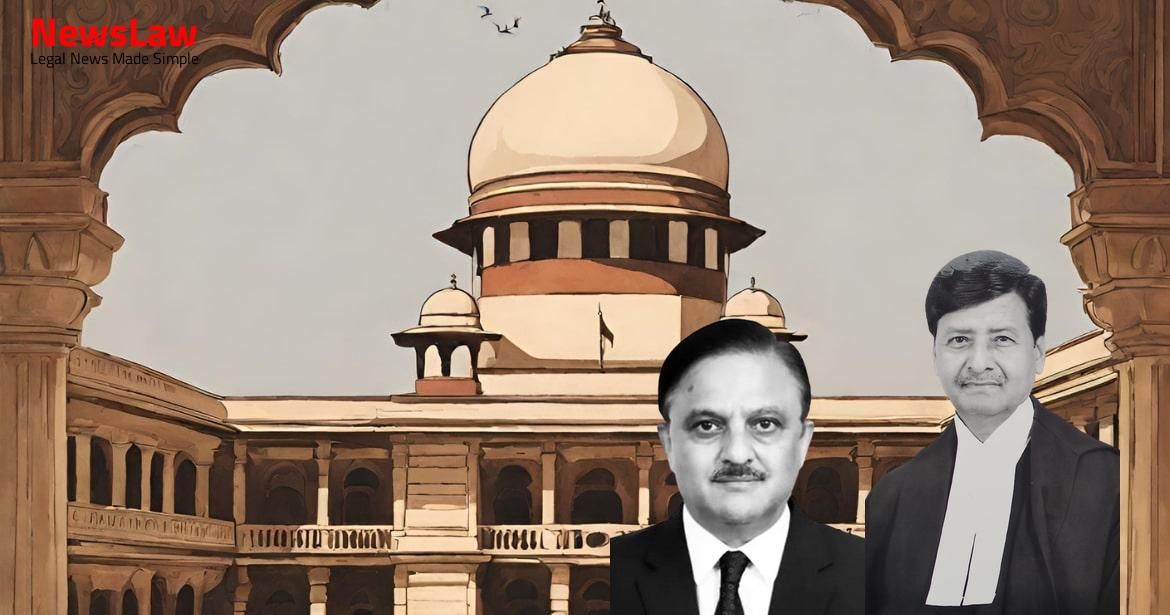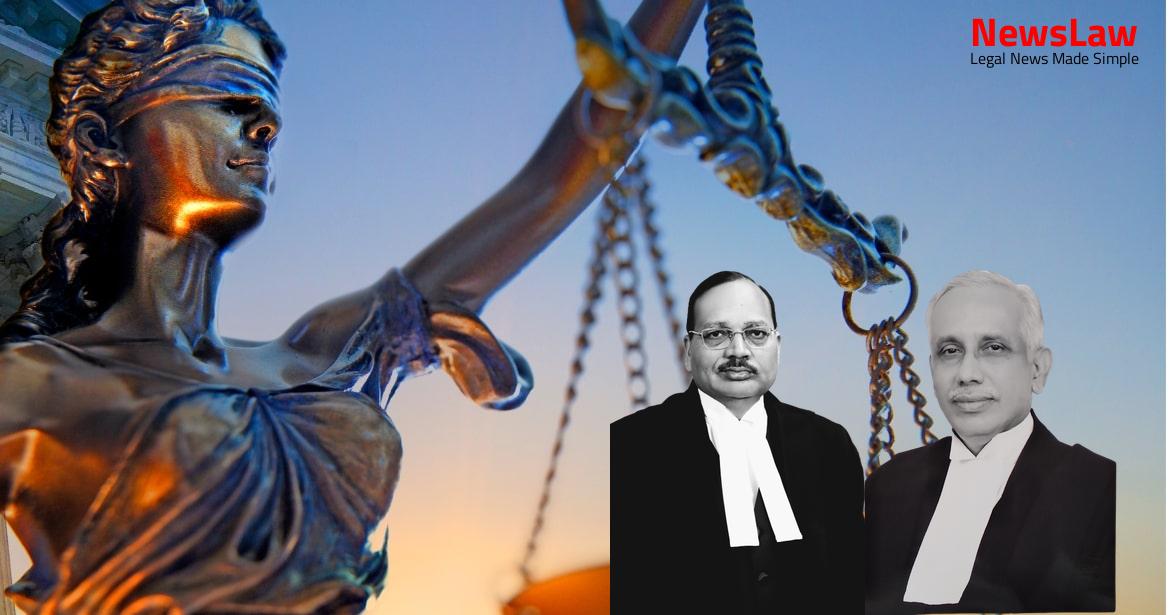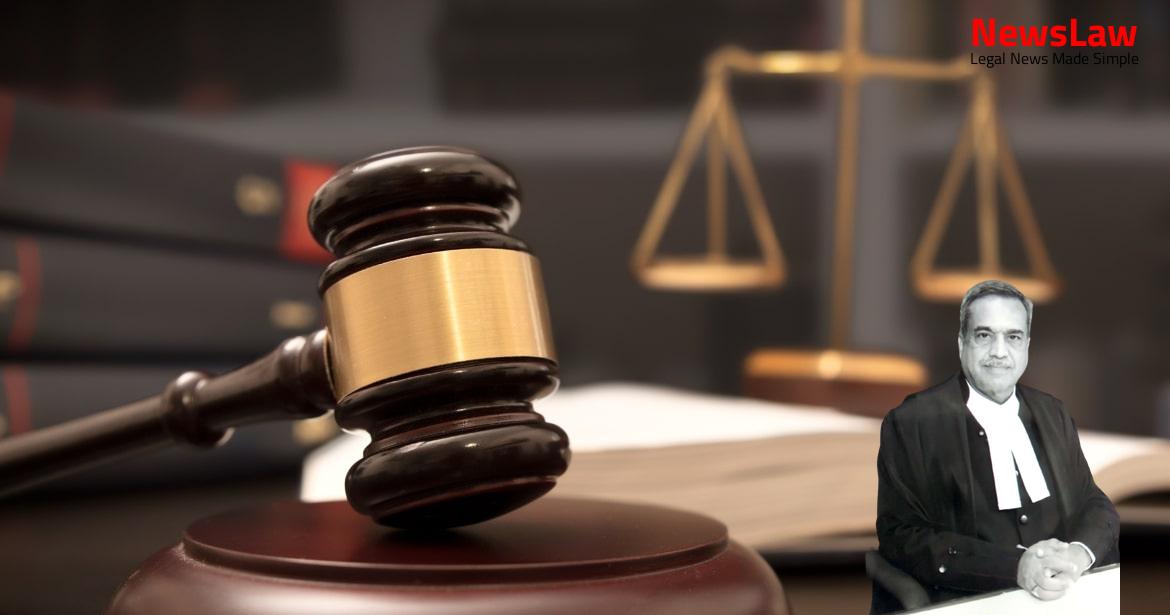Delve into the legal intricacies of prioritizing child welfare in custody cases based on the High Court’s meticulous legal analysis. Learn how the court weighs various factors and precedents to ensure the well-being and future prospects of the child are paramount. Stay tuned to understand the importance of the child’s welfare over parental rights in legal proceedings.
Facts
- The High Court issued directions for respondent No.2 to return to USA with the minor child by 30.09.2021.
- The petitioner was directed to bear travel expenses for the return, stay in USA, and not initiate legal proceedings for inter-country removal of the child.
- In case of non-compliance, custody of the child and passport were to be handed over to the petitioner by 01.10.2021.
- The High Court appointed an amicus curiae for interactions with parties, and various interim orders were passed.
- The respondent No.1 filed a petition for custody in the US Court, citing violations of travel consent by the appellant no.1.
- The Court allowed respondent No.2 visitation rights and temporary custody, along with provisions for video calls.
- The heating summary discussed the medical history of the child, citizenship status, and the surgery undergone.
Also Read: Admission Deadline Adherence in Medical Courses
Arguments
- The learned counsel for the respondent no.1 argued that there is no evidence provided by the appellants to prove the child’s continuous need for medical treatment.
- The grandmother of the child is currently caring for him, with family support available as she resides with her parents.
- In custody cases, the welfare of the child cannot disregard the mother’s role entirely.
- The appellant no.1’s detailed affidavit highlighted reasons why the child should remain in India until the age of 9-10.
- Refusal to acknowledge a woman’s mothering rights is a violation of her fundamental privacy and autonomy rights under Article 21 of the Constitution of India.
- Increasing cases of international parental child abduction have led the US Immigration Authorities to restrict a minor US citizen from leaving the country without both parents’ consent.
- The appellant no.1 is the primary caregiver and should retain custody for the child’s best interest.
- A detailed hearing is required for the child’s medical evaluation.
- The respondent no.1’s support for the appellant no.1’s visa application was deemed insincere, based on various allegations made against her.
- The respondent no.1’s focus on litigation rather than collaboration for the child’s benefit was highlighted.
- The Indian medical system is considered better suited for the child’s care in this case.
- The decisions in the cases of Nithya and Kanika are considered binding precedents to be followed.
- The respondent no.1 has been actively involved with the child through regular video conferences as per the interim order of the High Court.
- The desire of the respondent no.1 to settle in India was emphasized through land purchases in Bangalore.
- The argument for maternal preference and the doctrine of tender years was presented to support the appellant no.1’s custody rights.
- The respondent no.1 received advice to obtain a B-2 non-immigrant visa for the appellant and the child to travel to the USA.
- The visa invitation letter from respondent no.1 stated his commitment to cover all tour expenses for the appellant, including airfare, food, housing, and medical insurance in the USA.
- The counsel argued that principles of autonomy must apply to non-state persons as well, citing the case of K.S. Puttaswamy v. Union of India.
- The High Court’s order was deemed balanced and consistent with the law outlined in the cases of Lahiri and Yashita.
- No interference was deemed necessary with the equitable order passed by the High Court.
Also Read: From Nominee to Disqualified: Supreme Court Scrutinizes Age Evidence, Declares Election Invalid
Analysis
- The welfare of the child is the paramount consideration in habeas corpus cases.
- The High Court considered relevant factors and previous court precedents in reaching its decision.
- The rights of the parents are considered irrelevant when determining custody.
- Each case is unique and must be decided based on the facts and circumstances presented.
- Visitation rights are granted for the welfare of the child.
- The High Court examined documents and reports to assess the best interest of the child.
- An option was given to the appellant to return to the USA with the child.
- The child’s well-being and integration into the environment of their native country were significant factors in the decision.
- The High Court did not treat the USA court order as conclusive.
- The High Court justified its decision based on the welfare and future prospects of the child.
- The court emphasized the importance of the child’s welfare over personal rights of the parents.
- The Court considered factors such as medical care, social environment, and education in reaching its decision.
- Consent for travel and custody arrangements were discussed and evaluated by the High Court.
- Provisions for visitation rights and financial support were made in the judgment.
- The High Court found that the child’s return to the USA would not be harmful and would provide better future opportunities.
- In the case of Kanika, the Court emphasized that the welfare of the child is the sole criteria to be considered in issues regarding the repatriation of a child.
- The decision in the case of Prateek Gupta reiterated that the welfare of the child is the primary concern when dealing with such matters, rather than the legal rights of the parents.
- The Court in the case of Nithya clarified that each case must be decided based on the totality of facts and circumstances presented before the Court.
- Consistent views on the welfare of the child have been reiterated by the Court in various decisions including Nithya Anand Raghavan and Prateek Gupta.
- The Court emphasized that the welfare of the child should be the paramount consideration in matters of appointing or declaring guardians of minors as per the Hindu Minority and Guardianship Act, 1956.
Decision
- Appellant no.1 is given the option to travel to USA with the minor child to contest proceedings pending there.
- Appellant no.1 must communicate her willingness to travel within fifteen days to the respondent no.1.
- Respondent no.1 must provide air tickets, transfer money, and ensure proper medical insurance for the appellant no.1 and the minor child.
- Temporary custody arrangements include video calls and visitation rights for the respondent no.1 in USA.
- The High Court suggests the parties consider an agreed joint parenting plan.
- This order does not finalize the rights of the parties and the respondent no.1 must arrange separate stay for the appellant no.1 in USA.
- The appellant no.1 has fifteen days to communicate her willingness to travel, and the respondent no.1 must facilitate visa extension if needed.
- Financial support and medical treatment responsibilities are outlined for the respondent no.1 during the appellant no.1’s stay in USA.
- For a period of three months, the respondent no.1 is restrained from enforcing previous court orders to allow the appellant no.1 to contest the petition filed by the respondent no.1.
Case Title: VASUDHA SETHI Vs. KIRAN V. BHASKAR (2022 INSC 46)
Case Number: Crl.A. No.-000082-000082 / 2022



